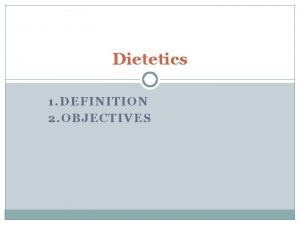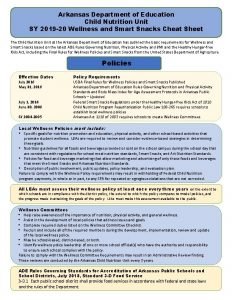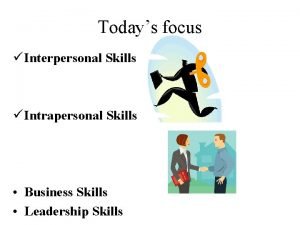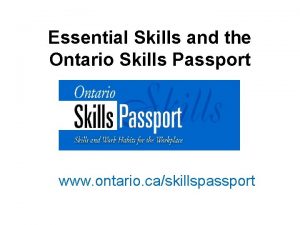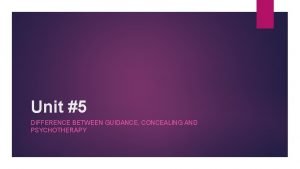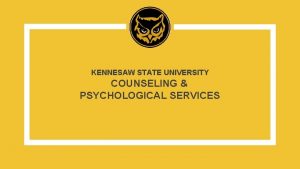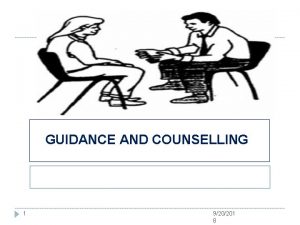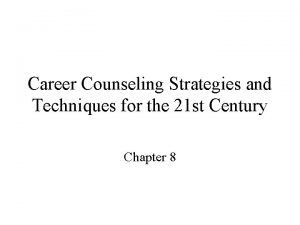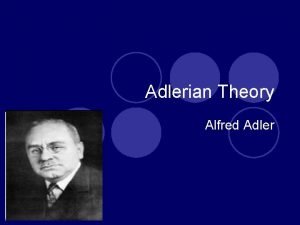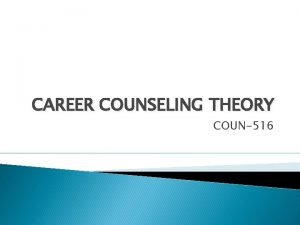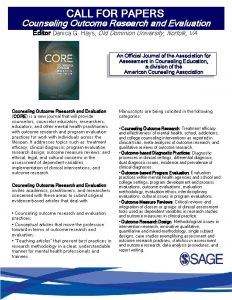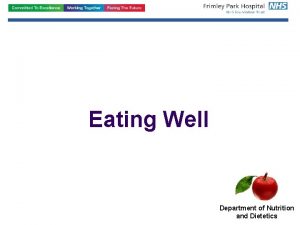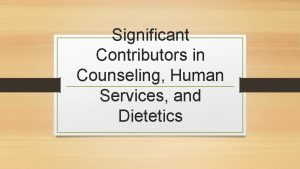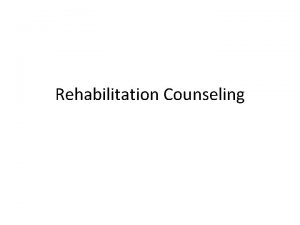DEPARTMENT OF NUTRITION AND DIETETICS COUNSELING SKILLS II




















- Slides: 20

DEPARTMENT OF NUTRITION AND DIETETICS COUNSELING SKILLS II M. Sc FOOD SERVICE MANAGEMENT AND DIETETICS SUBJECT INCHARGE: R. KAVIYARASI

• • COUNSELING SKILLS objectives Definition of counseling Types of Counselling Need of counseling Expectations of counseling Goals of counseling Scope of counseling Limitations in counseling conclusion


Definition of counseling • Counseling is an art and science. It’s a short term, interpersonal, theory based, helping profession. Its aim is to resolve developmental and situational difficulties. Counseling helps to bring change in life: Change in thought; Change in emotion; and Change in behavior.

• Counseling is a profession. Practitioners should complete a prescribed course of study usually leading to a master’s degree or a doctorate degree. • Counselors are members of organizations that set professional and ethical standards and promote state licensing and certification by national associations (Wittmer & Loesch, 1986).

• Counselling is a process that focuses on enhancing the psychological well-being of the client, such that the client is then able to reach their full potential. This is achieved by the counsellor facilitating your personal growth, development, and self-understanding, which in turn empowers you to adopt more constructive life practices. • Counselling may be helpful in a number of ways.

• It can enable you to develop a clearer understanding of your concerns and help you acquire new skills to better manage personal and educational issues. • The counsellor can offer a different perspective and help you think of creative solutions to problems. • Sharing your thoughts and feelings with someone not personally involved in your life can be most helpful

Types of Counselling can be split into two distinctive forms: Ø Directive counselling Ø Non-Directive counselling Directive Counselling: involves a formal process where the counsellor assesses the situation, decides an appropriate course of action and directs the employee to follow this course of action. Non-directive Counselling: involves the counsellor facilitating a process where the employee deals with their issues.


Need of counseling Counseling is needed to solve psychosocial problems of the counselee. • For creating self sufficiency to the client. • For better social functioning. • For the client to make functional decisions. • For the attitudinal and behavioural change of the counselee. • For managing anger, stress, anxiety, depression, frustration etc.

Expectations of counseling can include: • Insight and understanding of oneself, with greater self-awareness. • Changing of one's beliefs and mental models. • Increased acceptance and appreciation of oneself. • Increased emotional intelligence. • Increased ability to control oneself and one's urges. • Development of skills and abilities that require self-management.

Cont…. • Improved motivation towards actions that are good for one's self. • Understanding of others and why they act as they do. • Increased appreciation and care for others. • Improvement in relationships with others. • Changing of relationship with family, friends and others. • Making amends for past negative actions.

Goals of counseling The five major goals are : • Facilitating behavior change. • Improving the client’s ability to establish and maintain relationships. • Enhancing the client’s effectiveness and ability to cope. • Promoting the decision-making process. • Facilitating client potential and development.


Scope of counseling Clients are encouraged to meet with a counselor even if they are not sure that they need counseling. Any clients facing the following common problems are encouraged to see a counselor: • Academic Performance • Trouble with Concentrating, Studying, or Attending Classes • Anxieties about Aspects of Study including Exams and Presentations • Achievement Conflicts • Family Issues • Anxiety/Persistent Worry/Panic Attacks • Bereavements and Parental Separations • Cultural Concerns

• • Stress • Life Transitions • Loneliness/Isolation/ • Homesickness • Difficulty Adjusting to • Life • • Relationships/Intimacy • Issues • Friend or Roommate • Conflicts Difficulty Making or Keeping Friends Lack of Self Confidence or Low Self esteem Self-Injury Suicidal Thoughts Worries about Appearance Anger Management

• Grief/Loss • Identity Confusion • Sexual Orientation/Gender Identity • Eating or Sleeping Disorders/ Body Image Concerns • Weight Loss or Gain • Depression/Apathy • Sexuality • Abusive Relationships • Alcohol or Drug/Substance Use/ Abuse • Sexual Assault/Rape/Abuse • Pregnancy • Difficulty in making Decisions • Uncertainty about the Future.

Limitations in counseling • Person being counselled may not have trust in his counselor (normally, his superior) or the organization • Suspicion over the level of confidentiality • Organization's constraints on using it's resources, time and efforts • Lack of skills of the counselor

conclusion • Counselling can be explained as a discussion of a emotional problem with an client with the general objective of decreasing it. • It helps to grow self confidence, understanding self control and ability to work effectively in an organization

 Objectives of dietetics
Objectives of dietetics Drive.google
Drive.google Idaho academy of nutrition and dietetics
Idaho academy of nutrition and dietetics Ubc dietetics program
Ubc dietetics program Arkansas department of education child nutrition unit
Arkansas department of education child nutrition unit Arkansas child nutrition unit
Arkansas child nutrition unit Nebraska department of education nutrition services
Nebraska department of education nutrition services Pengertian interpersonal skill
Pengertian interpersonal skill Hard skills definition
Hard skills definition Ontario skills passport essential skills
Ontario skills passport essential skills Pros and cons of artificial nutrition and hydration
Pros and cons of artificial nutrition and hydration Difference between guidance and psychotherapy
Difference between guidance and psychotherapy Missouri comprehensive school counseling program manual
Missouri comprehensive school counseling program manual Ksu counseling and psychological services
Ksu counseling and psychological services Father of philippine guidance
Father of philippine guidance Elements of counselling
Elements of counselling Counseling strategies and techniques
Counseling strategies and techniques Alfred adler theory
Alfred adler theory Frank parsons’ trait and factor theory
Frank parsons’ trait and factor theory Counseling outcome research and evaluation
Counseling outcome research and evaluation 12 core functions of substance abuse
12 core functions of substance abuse
